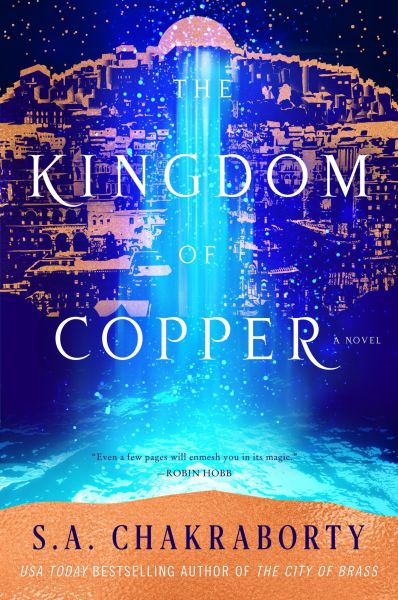Eye for an Eye
The Kingdom of Copper (Daevabad, volume 2)
By S A Chakraborty

12 Jun, 2019
2019’s The Kingdom of Copper is the second volume in S. A. Chakraborty’s Daevabad Trilogy.
Nahri escaped her life as a confidence agent in French-and-Turkish occupied Cairo with a few, well-chosen words. Or rather, by accidentally summoning a djinn during a faked exorcism. The djinn Dara whisked Nahri off to Daevabad, the city of the djinn, where she was soon entangled in cut-throat court politics. Nahri is, it seems, the last remaining person with a blood tie to the previous dynasty, the Nahids.
Her mere existence threatens the current ruler, Ghassan. Ghassan attempts to defuse the threat by marrying Nahri to his loyal, if dissolute, son Muntadhir.
Nahri seems to have been neutralized, her closest friends in Daevabad either dead (Dara) or exiled (Ali, Muntadhir’s brother). Nahri herself is a virtual prisoner in the royal palace. While Muntadhir is somewhat fond of his new wife, his first loyalty is to his family. If preserving his family requires that Nahri be killed, then that is what Muntadhir will arrange.
Not everything goes as planned. Dara is summoned back from the realm of the dead. Ali, fleeing would-be assassins, discovers that he has gained affinity with and control over water, a talent that is valuable enough that is gains him a refuge. Nahri develops such a link too, to the very buildings in which she is kept.
Five years pass.
Ghassan’s family took the throne with violence and bloodshed. They have held it by brutally punishing disloyalty and disobedience. The clan is not beloved by its unwilling subjects. Even Ghassan’s children dislike him. Inside Daevabad and outside, dissidents scheme.
When the time is right, they strike.
Had the various factions trusted each other, they might have presented a unified front. As it is, the result is carnage-filled chaos.
~oOo~
I regret to say that while Nahri, Ali, and even Muntadhir learn from experience and grow as people, the same cannot be said of Dara. He has been transformed by death and yet he remains essentially the same person he has been for the last few thousand years: a homicidal knucklehead. Oh, well. Perhaps he will have his moment in book three.
This inability to learn from the past is not unique to Dara. Ghassan’s go-to solution for every problem is start with beatings, then escalate until either the problem goes away or someone’s head is on a spike. Similarly, most of the people who want to replace Ghassan aren’t trying for democracy; they just figure that they would be better autocrats. Not that this setting features all that many democracies to imitate.
Note that this is book two of three. It develops themes, settings, and characters set up in the first book, but stops (on a cliff-hanger) before it can drop too many hints re the conclusion. That is not to say that nothing happens in this novel. The body count is high.
The setting will be new to many Western fantasy readers (well, except for the ones raised on various translations of One Thousand and One Arabian Nights). The characters and the general arc of the story, on the other hand, remind one of many other castle opera fantasies: naive outsider who probably has a Destiny waiting for her in the wings, several personable contenders for her affections, vicious court intrigue, and so on (although at least the FATE OF THE WORLD isn’t riding on who rules Daevabad). Readers looking for a competently executed variation on a familiar story may enjoy this.
The Kingdom of Copper is available here (Amazon), here (Amazon.ca), and here (Chapters-Indigo).
